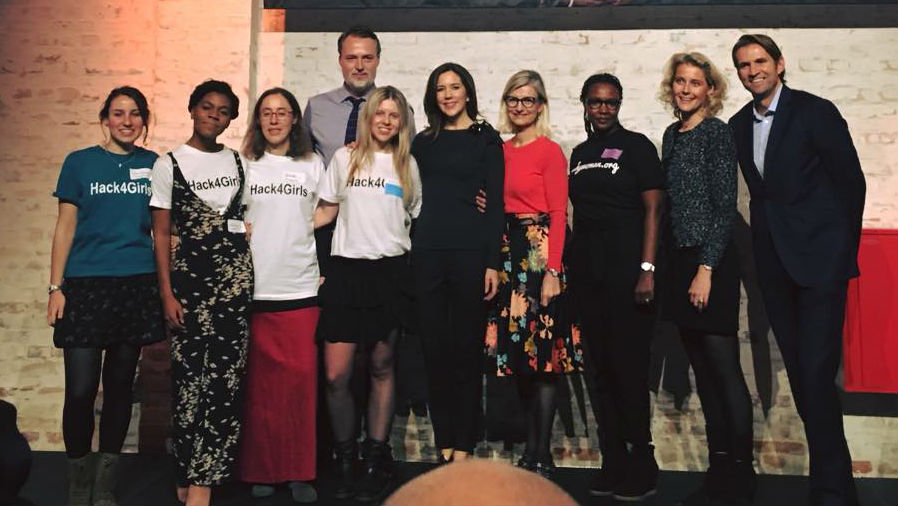Hack4Girls – A Hackathon to support Refugee Women and Girls
Yesterday, Maternity Foundation and partners hosted the finale of the Hackathon event Hack4Girls. HRH Crown Princess Mary and Minister for Development Cooperation Ulla Tørnæs attended the finale.
Hack4Girls brought together talents from tech, NGOs and creative industries in Copenhagen to find new solutions using technology for better reproductive health for refugee girls and women. The App LadyGuide was selected as the winner among the three finalists by a panel of prominent judges, including CEO of Microsoft Denmark Marianne Dahl Steensen and entrepreneur and chair of UN Live Online, Jimmy Maymann.
More than 65 million people are currently forcibly displaced worldwide – the highest number in decades, according to UNHCR. Half of these are women and girls. They face increased risk to their health and well-being, including gender-based violence, early or forced marriage, unwanted pregnancy and maternal mortality.
The vast majority of maternal deaths happen in humanitarian settings. For Maternity Foundation, a maternal health NGO with a mission that “No woman should die giving life” and a focus on leveraging technology to reach the most vulnerable, Hack4Girls is an obvious project to engage in.
To help these women and girls, a 36-hour “hackathon” was held in Copenhagen where startups, NGOs and creative industries will meet to create new tech solutions that support the sexual and reproductive health and rights of refugee girls and young women. More than 70 young designers, IT-architects and developers got together during the weekend to use their brainpower for solutions adapted to women in displaced contexts.
Lady Guide – an offline self-assessment guide
The winner “LadyGuide” is an easy-to-use App, an offline self-assessment guide that teaches girls about reproductive and female health. This image-based product aims to relieve girls of the worry and shame associated with their bodies. LadyGuide was the winner among others due to its easily scalable and culturally adaptable design. They competed in the finals with “Micro-Ed” health phone education for girls and “Pod4Girls” a soap opera podcast about reproductive health. See all the great solutions here: Hack4Girls.org
The Hackathon event symbolizes the need to working together to overcome the reproductive health challenges women face. Among the guests in the finale was HRH the Crown Princess of Denmark and Minister for Development Cooperation Ulla Tørnæs, who stated:
“Every day more than 500 women and girls die in humanitarian and fragile settings due to complications related to pregnancy and birth. And one out of five displaced women is sexually abused. These casualties are unacceptable, and the international community can and must do more to stop them. I am very hopeful that the Hackathon will provide innovative ideas and technological solutions that can help improve the life for young women in humanitarian crises.”
Context and partnership for sustainable solutions
In hosting the hackathon, Denmark joins a global trend to solve the world’s greatest challenges with technology. International startup communities, social entrepreneurs, public and private partners are working together to drive positive change, from climate change and healthcare to education and humanitarian causes.
Jonas Keiding Lindholm, Secretary General, Save the Children Denmark: “The young girls embraced in this project often lack awareness of reproductive and sexual health. This, in turn, increases the risk of unplanned pregnancies early in life. We hope that technological innovation may empower the girls though information and thereby also improve the chances that their future children will experience a safer and less vulnerable childhood”.
Anna Frellsen, CEO of Maternity Foundation: “The global proliferation of mobile phones and connectivity calls for a new mindset among NGOs. We must seize this opportunity to deliver training, information and services in a more efficient and cost-effective way. One example is our Safe Delivery App, which now allows us to deliver quality health learning to midwives in more than 40 countries – even in the most hard-to-reach places.”
CEO of Microsoft Denmark, Marianne Dahl Steensen: “The beauty of technology is that it’s not only for the few – it’s for everyone. Unfortunately, not everyone is capable of embracing technology. Therefore we, who live in the privileged parts of the world, carry a responsibility to make the technological advancements available for everyone. We believe that technology can empower humanity, and that it enables better conditions and quality of life for every person on the planet.”
Natasha Friis Saxberg, digital strategist, entrepreneur and organizer of the hackathon weekend: “There is enormous potential in using tech to solve global challenges. Startup communities and businesses across the globe are moving towards merging growth with social impact. We must combine wealth with health – for societies, humans and businesses – to transform our future in a digital era. Government, NGOs and companies need to work together to make this impact last, and I’m thrilled we have been able to do this here in Denmark.”
The hackathon event was co-created by a number of partners, including the Ministry of Foreign Affairs of Denmark, UNFPA, Microsoft, Save the Children, the maternal health NGO Maternity Foundation and digital strategist and entrepreneur Natasha Friis Saxberg.
The winning team LadyGuide received a cash prize of 25,000 DKK, sponsored by Microsoft, and incubation support from tech and NGO partners in the further development of their solution. We look very much forward to work with the winners and support them with our experience in scaling technologies for low ressource settings.
Learn more on facebook.com/hack4girls/





